How to Store a Lawn Mower Outside Without a Shed
Author: Chris Miller | Editor: Omar Alonso
Review & Research: Jen Worst & Chris Miller

You've bought a new lawn mower for your yard, but the problem is you don't have a shed on your property. Now what? This is how to store a lawn mower outside with no shed.
Can you leave it outside at the mercy of the elements? Most homes don't have a shed, so many homeowners store machinery like lawn mowers in the garage. But what if you don't have a garage or your garage is too small to fit a lawn mower and your car in the same space?
Does Storing a Lawn Mower Outside Without a Shed Damage the Machine?
All types of lawn mowers are rugged machinery, and most have some level of protection against the elements. That said, it's not something you want to leave out in the open. First, it's going to eventually get damaged by the rain, snow, or sun, and second, someone might decide it's an easy mark and steal it.
If you have a heavy downpour, rain might get into the spark plug cap or enter the engine housing. It might also saturate the circuit boards on electric models or damage the battery. Snow is also a concern, and it could damage the mechanical or electrical components of the mower.
Weather Conditions & Outdoor Lawn Mower Storage
When considering how to store your lawn mower outdoors, you'll need to look at the climate conditions in your area. It can be done rather than having it in your garage with the smell of gasoline in your house.
Can You Store a Lawn Mower Outside in the Sun?
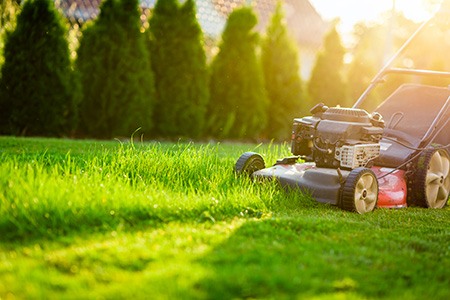
You want to know where to store a lawn mower with no shed, but the real question is how to keep it out of the direct sunlight. Leaving the mower out in the sun for extended periods likely won't cause much damage to the machine. However, extended exposure to UV rays results in fading of the plastic parts, bleaching the colors while making the plastic brittle and prone to cracking.
Leaving a gas-powered mower in the direct sun, especially during the hottest times of the day, can be dangerous. Gasoline expands under high temperatures, and it could end up exploding if it ignites under the increased pressure. The plastic design of mower fuel tanks allows fuel vapors to leak through the tank. If there's a spark around the tank... well, not good.
If you're storing the mower outdoors in the summer, keep it in a shady spot. It can get morning sun, but don't let it catch UV rays after 10 AM. A lightweight, protective cover will protect it from the rain. So can you leave a lawn mower outside? Yes, with a little preparation.
Can You Store a Lawn Mower Outside in the Winter?
The winter and cold conditions may damage your lawn mower. The winter also doesn't require you to use the mower, so you'll be storing it for long periods. The grass doesn't grow when it's cold out and there's snow on the ground.
The cold, snow, and ice can damage the mower, reducing its service life. If you're storing it outdoors in the winter, you'll need a protective cover or box for the machine. Keep it in an area out of the wind and snow, on a leeward-facing side of your home.
Can You Store a Lawn Mower Outside in the Rain?
A light afternoon shower on the mower likely won't result in damage to the machine. However, repeated exposure to rain means the steel parts of the mower start to rust, including the blades. You could end up with problems involving the electrical components or the spark plugs.
You need to figure out not only how to store a lawn mower outside but how to dry it out if you allow it to get drenched. Leave it in the sun to dry for a few hours if it gets wet. Buy a protective cover and store the mower in a sheltered spot, such as under an awning or under the roof around the house.
Will the Lawn Mower Rust If You Store It Outside?
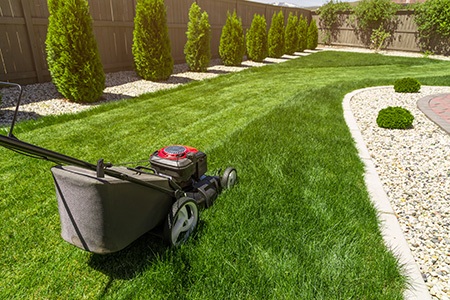
All mowers have steel blades under the cutting deck. While they're treated for moisture, the coating wears away after a few years. So, it's important to have your mower maintained seasonally. Get the blades sharpened and retreated against moisture for the best results with cutting your lawn during the summer.
The other components of the mower are usually powder-coated and water-resistant. However, over the lifetime of owning your mower, it might endure scratches in the powder-coated surfaces on the cutting deck, wheels, and handles. Scratches remove the protective coating, and these areas become prone to rusting and corrosion.
The engine usually features design and construction with non-corrosive metals if you have a gas-powered model. However, extended exposure to rain and moisture may lead to the bots and nuts fastening the components to the motor, and the engine to the cutting deck may start to rust and corrode.
Seasonal maintenance ensures you don't let rust or corrosion get out of hand. Find a local service agent in your area and enquire about the cost of lawn mower maintenance with them.
Short-Term Outdoor Storage for Lawn Mowers
Most homeowners use their lawn mowers once a week or once every other week. Regularly using your mower ensures you don't experience any fuel separation in the gas tank, the engine remains sufficiently lubricated, and the mower stays dry. But it's not just where to store your lawn mower but how to do so.
We recommend covering the mower with a waterproof cover or tarp when it's not in use during the summer. When it's not in use, cover the mower and leave it under the roof overhang or eave on a leeward-facing side of the house, away from the wind and the primary rain direction.
Several custom mover covers are available from online retailers that fit specific mower designs and sizes. These covers offer you the best protection from the sun and rain. You also have options for plastic storage boxes or affordable tents to use as a temporary shed for storing your mower when it's not in use.
Seasonal Storage Tips for Lawn Mowers
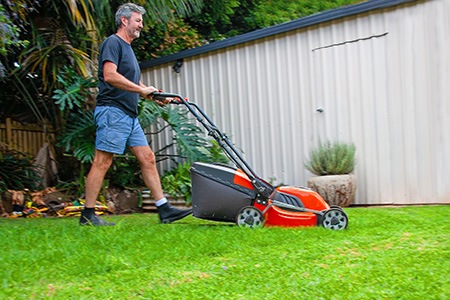
As mentioned, when the winter rolls around, it's time to store the mower away for the long term. Start by having the mower serviced. Our tips for how to store a lawn mower outside still apply but you need some preparation to allow the mower to stay outside during the winter.
Take it to an agent or servicing business in your area and have them sharpen and treat the lawn mower blades. They'll drain the fuel tank and ensure the mower is ready for use the following season – all you have to do is add the fuel and start it up.
You can save yourself some money and do a DIY winterization of the mower if you have the time and handy experience. However you'll need professionals to sharpen the blades, but that's not always necessary at the end of every season.
The biggest concern with the DIY winterization of your mower is draining the fuel tank. If you leave the gas in the tank, it will separate after a few months. The separated gas blocks the carburetor jets, making it impossible to start the mower. As a result, you'll have to take the machine to the agents for servicing, and stripping and rebuilding the carb is expensive.
After draining the tank, clean the mower. Scape all the dirt and compressed cuttings from around the inside of the cutting deck using a flexible plastic tool. Don't use a steel chisel or trowel to do it; you'll scratch the cutting deck and cause it to rust.
After cleaning the machine (don't forget to dispose of the grass clippings stuck under the deck), reconnect the spark plugs and store the mower somewhere out of the way with a protective cover shielding it from the elements. Collapsing the handles to reduce the machine's profile and make it easier to store in tight spaces is a good idea.
Outdoor Storage Methods for Different Lawn Mower Models
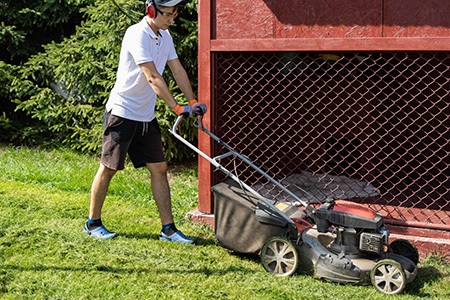
Lawn mowers come in electric and gas-powered models. While they both provide the same function, they're very different machines in terms of how they work. Here are a few storage tips for each model.
Gas-Powered Mowers – The fuel is the biggest issue with storing gas-powered lawn mowers. Ensure you follow the guidelines above and drain the tank for seasonal storage. After taking the lawn mower out of storage, replacing the fuel filters before re-gassing the machine is a good move.
Electric Mowers – Protection for the power cable is the biggest concern with storing electric lawn mowers. Keep it dry and prevent moisture from getting into the plug or the controls. Remove the battery from the mower and store it somewhere dry inside your home.
Don't leave the battery connected to the charger for long periods, or you might weaken the battery or potentially cause the battery to explode or start a fire. Keep the battery at room temperature and in a dry, dark place away from moisture.
Key Takeaways Regarding Storing a Lawn Mower Outside
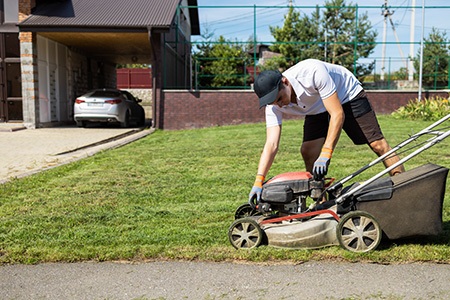
Let’s recap with a summary of the main points from above:
- Lawn mowers are rugged, durable machines, but you can't expose them to the elements for long periods.
- If you don't have a shed or garage, ensure you get your lawn mower a cover from an online retailer.
- Covers are inexpensive and easy to fit into the lawn mower.
- We recommend getting a breathable cover to avoid moisture building under it and damaging the lawn mower.
- If you have a gas-powered model, drain the fuel before long-term storage, or the gas separates, causing issues with the fuel system.
- Replace the fuel filters seasonally to avoid degradation.
- Add fuel stabilizer to the gas if you mow the lawn every other week, and don't use all the fuel in mowing sessions. The stabilizer stops the fuel from separating.
- Store electrical mower batteries in a cool, dry space over the winter. Don't leave them connected to the charger.
The obvious points are protecting your lawn mower from the sun, rain, moisture, rust, and other weather related issues.
That’s How to Store a Lawn Mower Outside With No Shed
The absolute cheapest thing you can do to store your lawn mower outside is to buy a tarp to secure over it. There are also lawn mower covers that will fit the form of your push mower or riding lawn mower, too. Otherwise there are cubbies you can build or purchase with doors and lids, as well as canopies or small carport covers. That's how to store a lawn mower outside with no shed.



